The end of an era – what was Daniel Craig’s best Bond film?
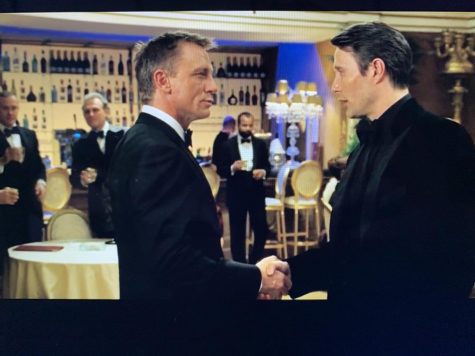
Back in 2006, fans of the James Bond series harshly criticized Daniel Craig — Pierce Brosnan’s replacement as the new bond. Now, 15 years later, we cannot imagine a 007 who is not Craig.
Whether or not you are a fan of the British spy, you most likely know the story: a suave MI6 spy with a license to kill who drinks martinis (shaken, not stirred) and fights adversaries and evil organizations with brain and brawn.
After a span of 16 years and 5 movies, Craig has decided to step down as the face of the Bond franchise with the release of the new film No Time to Die.
In a sense, the entire series tells the story of one adventure: Bond against Spectre — and the evil organization’s byproducts. Closing it all out is No Time to Die.
As the final act draws to a close and the curtain falls, I wonder: what is the best Daniel Craig Bond film?
Casino Royale (2006)
The first Bond movie with Daniel Craig is an origin story; we get to see why Bond becomes who he is in the later films.
I’ll admit: this film is my favorite of the series. While watching the other films, I find myself referencing this masterpiece often, understanding on a deeper level why Bond acts the way he does.
Daniel Craig has a new take on the traditional James Bond: he is not a perfect, athletic, and suave spy — far from the smooth Bond from the Pierce Brosnan era. The Craig-era Bond is, as M puts it, a “blunt instrument,” extremely capable in performing his duty: being a hitman.
In addition, even the villain is not an overwhelmingly powerful bad guy with an entire army at his command. (We get to that a little later.) Instead, Le Chiffre is a mathematical genius with little power, killed quickly when failed to meet the expectations of the higher-ups. He was only a pawn in a larger plan — hinting at the movies to come.
The different characters signify a new Craig Bond era, one unique to those that come before. Bond becomes humane, making him more relatable and interesting compared to his more one-dimensional predecessors.
The movie itself can be clearly cut up into 3 acts, all filled with action and character development. From an airport in Miami to a high-stakes poker game in Montenegro to a collapsing building in Venice, Bond’s character is fleshed out, and he is softened by love and hardened again by betrayal.
Bond is always behind the villain — a motif that would continue to later movies. He wins in the end only with a combination of luck and help.
Overall, this movie successfully sets up the entire rest of the series and paints a picture of the new Bond in vivid detail with an interesting plot, making it my favorite movie of this era.
Quantum of Solace (2008)
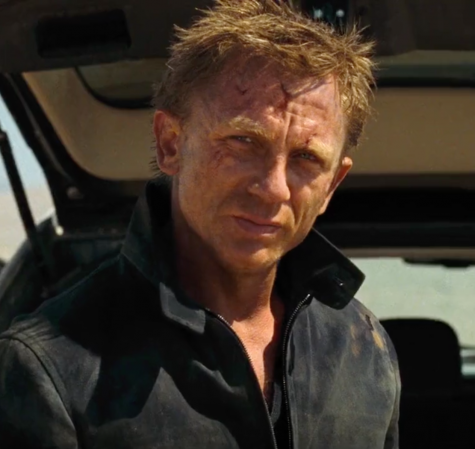
Although the first Craig-era Bond movie went off with a bang, the sequel teetered off a bit with, in my opinion, the worst movie of the series.
The film likewise sheds light on the morality of the double-O program. However, it focuses less on the character Bond and more on the action and fight scenes themselves — a downgrade from Casino Royale.
There were issues with the film work itself; quick cuts and confusing camera movements ruin some action scenes. Although not bad, Quantum of Solace is not good either. It feels more like a placeholder movie that acts as an ending to Casino Royale, with no real significance of its own. I place this at the bottom of my list.
Skyfall (2012)
The third Bond movie is my second favorite Craig-era Bond film — first, if only considering the movie itself and not the entire series.
Symbols send powerful messages about themes: the contrast between old and new as well as the consequences and collateral damage from missions. Its details — such as the villain Silva dying from being stabbed in the back (a literal representation of betrayal that acts as the exigence for the story) — add an extra layer of depth to the entire film.
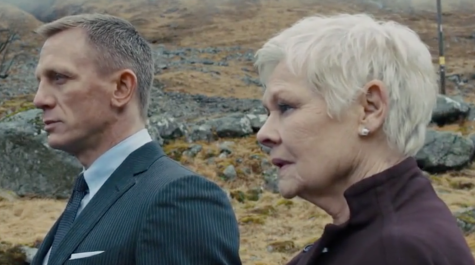
Javier Bardem’s performance as Raoul Silva tops my list as one of the best — if not the best — Bond villain. His character, a manic former MI6 agent betrayed by M, is brutal — yet also justified, as there is truth in his motivations. Dame Judi Dench’s performance as M is also incredible; her emotions and regrets shine through to the audience thanks to her phenomenal acting. It is M’s and Silva’s story as much as it is Bond’s.
The visuals were engaging as well as the sound design. These are best exemplified in the Shanghai silent fight scene — the best fight scene in the movie in my opinion. Entirely silent for almost ten minutes except for Thomas Newman’s score, we were transported into the skyscraper alongside Bond.
Even though this movie clearly has merit to it, it still falls short of Casino Royale. It does not fall into the continuing narrative that the films have had as well as Casino Royale nor does it delve deep into Bond’s character. Skyfall falls more under the traditional Bond movie compared to Casino Royale, yet Skyfall does not have the same charm and impact as my personal favorite.
Spectre (2015)
Spectre, my fourth favorite movie of the five films, connects the past three films together. Watching this, many of my questions were answered.
Riding off of Skyfall, the film falls short of my expectations. Restoring the classic Bond humor and the classic evil villain, this Bond film has its share of action. The villain’s monologue towards the end connects all the dots and offers an explanation to the events of the previous movies.
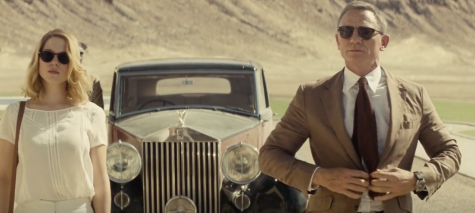
However, the film isn’t as defined as Skyfall nor does it offer as much of a new perspective into Bond’s character and the espionage field as Casino Royale. For me, it is the most similar to a stand-alone Bond film from previous eras — an obviously evil villain, Bond’s quips, great action sequences, and stunning locations. After watching No Time to Die, this film feels more like the context to the finale of Craig’s Bond.
No Time to Die (2021)
Concluding the series with a bang and a boom, No Time to Die ranks a close third behind Skyfall. This penultimate performance by Craig embodies what this specific Bond is all about in under three hours.
This film does not focus on love, revenge, or the consequences of Bond’s actions — instead, it is about family and finding closure. Without getting into spoilers, this movie picks up where Spectre leaves off, but jumps forward in time. We can see that the ending with Bond and Madeleine Swann does not last, jumping into action in the opening scene.
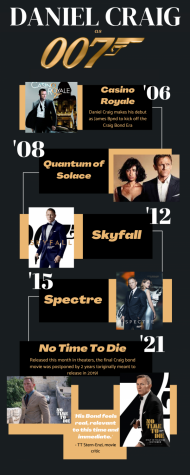
Understanding what happens next and why the scenes are impactful, however, requires knowledge of previous Bond movies.
The antagonist, Rami Malek’s Safin, is your run-of-the-mill powerful villain — this time even more powerful than the previous villains. However, his character is not as well-written as the other antagonists in the Craig era; he is shallow and undeveloped, leaving much to be desired towards the end.
All in all, however, it is a great film with many aspects of Bond; it ties up loose ends and gives closure to the Bond fans — and leaves us all wondering: what will happen in Bond 26?
End of an era
No Time to Die is truly the end of an era that gave a modern twist and more character depth to Bond than ever before.
Whoever is the next Bond has large shoes to fill; Craig’s tenure as Bond brought Bond alive in a different way to millions of people around the world.
Although each Bond film has its ups and downs, I can confidently say that I will miss Daniel Craig’s interpretation of Bond, James Bond.
Your donation will support the student journalists in the AVJournalism program. Your contribution will allow us to purchase equipment and cover our annual website hosting costs.

Verônica Jovencio • Sep 14, 2022 at 2:52 pm
Saudades